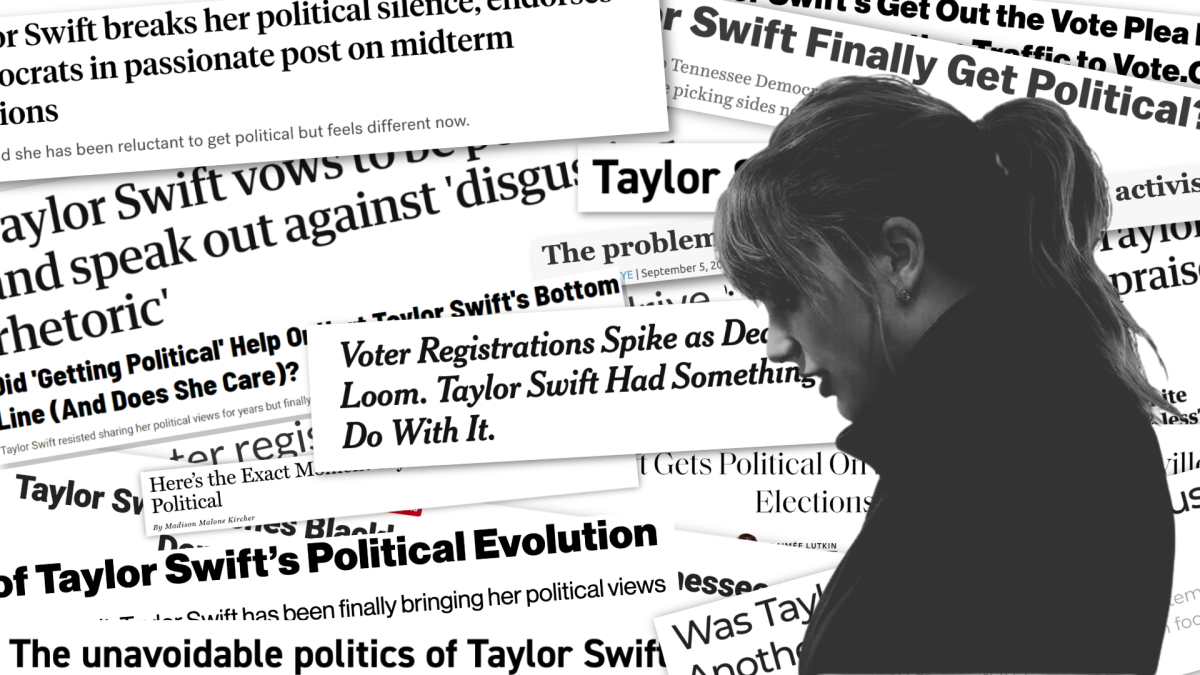There is no doubt that celebrities have a significant influence on various aspects of our lives. From Gigi Hadid’s vodka pasta recipe to Sophia Richie’s signature slick-back and Pinterest-worthy outfits, our habits and daily routines have been impacted by celebrities’ current trends. But more importantly, some celebrities have been influencing which political party we are voting for — or if we are voting at all.
As a Taylor Swift fan, I witnessed the birth of a political activist when the singer starred in Netflix’s “Miss Americana” documentary. Swift admitted she avoided debating politics for the majority of her career, but in 2018 she made up for her silence and stood up on behalf of the Democratic party in a midterm election in the state of Tennessee.
This year Swift encouraged her 272 million Instagram followers to register to vote with a post on her social media. The post resulted in a boost in registration numbers and in a single day, her incentive resulted in more than 35,000 million new registrations.
Swift isn’t the only celebrity who has played a crucial role in mobilizing voters, raising awareness about political issues and supporting candidates.
Another example is Frank Sinatra. The “voice” of the 20th century was also known for his involvement in various political and social causes. During the late ‘50s and early ‘60s, he was part of the Rat Pack, a group of performers, who not only made an impact with their entertainment careers but also shared their political affiliations and involved themselves in movements with the democratic party.
Sinatra was also one of the main advocates for civil rights and racial equality. He used his influence to speak out against racial discrimination and segregation, particularly in the entertainment industry.
Swift and Sinatra are examples of big names in the music industry who have been influencing voters all around the U.S. Yet, celebrities’ influence in politics has been a controversial and debated topic for decades. Should they really advocate and publicly state their political opinions?
Some people argue that celebrity involvement in politics can be superficial while others believe they should be expected to use their fame and name to advocate for causes and ideals they believe in.
In the internet-dominated environment we live in today, it is almost impossible not to see celebrities’ political opinions and activism through social media. Still, what intrigues me the most is how most people agree with the opinions of famous figures they support and follow.
Celebrity endorsements of political candidates or parties can polarize public opinion. Fans may feel driven to support a candidate or cause because a beloved celebrity endorses it, even if it contradicts their political beliefs.
People should formulate their own views about complex topics such as politics instead of blindly agreeing with other’s beliefs. No matter how famous one is, we all should have our views and try not to polarize public opinion.
The puzzling problem of celebrity influence in politics in our society isn’t their freedom of speech itself but the way people idolize celebrities at extreme levels.
It’s crucial for people to critically evaluate political endorsements and statements made by celebrities, consider multiple sources of information and then engage in informed and thoughtful political participation.
Whether celebrity influence in politics is good or bad is subjective and depends on multiple factors including specific circumstances, actions and individual perspectives. While citizens must formulate and evaluate public figures’ political influences, celebrities should have the right to express their thoughts about political issues carefully without reaching a point where they may become contentious.
















